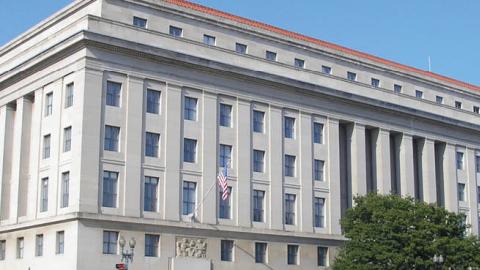The Federal Trade Commission has been on the march. Over the past month, the Commission has held two “open” meetings, rescinded two major bipartisanagreements by party-line vote, and positioned itself to write regulations for the first time in decades.
In the words of a former commissioner, the current FTC is “Icarus flying without the constraints of history, economics, or law.” He predicts that its “regulatory overreach…will end with the FTC’s wings melting in the courts.”
Yet one of the most consequential expansions of Commission authority has flown largely under the radar.
Section 5 of the FTC Act tasks the Commission with preventing “unfair or deceptive acts or practices.” What exactly is an unfair or deceptive act or practice? The answer has, perhaps purposely, evaded the FTC and courts for decades. Wielding Section 5 authority, the FTC has targeted all manner of industries, including health supplements, shoemakers, and even social media influencers. Recently, the Commission rescinded a bipartisan policy statement on this issue, giving American businesses even less notice as to what conduct might be considered a violation.
A central principle of American jurisprudence is that defendants are not presumed liable until a court of law determines otherwise. Correspondingly, defendants cannot be compelled to pay claimed damages until a court first finds liability.
In the Alice-in-Wonderland world of FTC investigations, legal principles were sometimes turned on their head. “Damages” were seized by the FTC long before the defendant had its day in court, and long before any finding of liability for Section 5 violations, thanks to a peculiar interpretation of another section of the FTC Act: Section 13(b).
Section 13(b), by its text, authorizes the FTC to seek temporary and permanent injunctive relief in federal court for Section 5 violations. Section 13(b) does not and has never mentioned anything about monetary damages. Yet for decades, courts looked beyond the text of the statute and held that Section 13(b) inherently empowered the FTC to seek monetary damages.
Under this extraordinary interpretation, the Commission could and did go directly to federal court and request monetary damages from accused parties. Accused parties never had the opportunity to present a defense. Sometimes the damages sought by the FTC were in excess of the total assets a defendant had, leaving it with scant resources to mount a legal defense.
Defendants in FTC investigations faced a Hobson’s choice: negotiate a settlement with the FTC and face financial ruin; or fight the FTC in court and, even if damages were never awarded, face financial ruin.
Such was the case with Vylah Tec, a Florida start-up accused of selling “unneeded” services to its customers. Without any prior notice or administrative proceeding, the FTC sued the company for millions of dollars, alleging Section 5 violations. Prior to trial, a federal court granted the FTC’s request for a preliminary injunction, freezing the assets of both the company and the owners personally, as well as transferring over $670,000 in assets into a receivership account. After the trial concluded, the court denied the FTC’s request for monetary damages. Yet after receivership and attorneys’ fees, only $34,500 was returned to the company.
Fortunately for the rule of law, these FTC abuses were recently curtailed. Earlier this year, the Supreme Court struck down the prior, atextual interpretation of Section 13(b). In doing so, it affirmed that “permanent injunction” does not mean “monetary damages,” and that, as currently written, Section 13(b) of the FTC Act does not empower the Commission to seek monetary damages for Section 5 violations.
In the wake of this decision, many criticized the Court, claiming it “ruled in favor of scam artists” and that the decision will “turn[] the agency into a paper tiger.”
But as the Court observed in its opinion, the FTC already has a better arsenal of administrative powers to protect consumers and seek consumer redress. Section 19 of the FTC Act already empowers the FTC to seek monetary damages for Section 5 claims. Section 19 focuses on actual harm, applying only when a reasonable person would have known under the circumstances that the conduct at issue was dishonest or fraudulent. Section 19 requires the FTC to provide actual notice to prospective defendants of their alleged illegal conduct via an administrative proceeding and issuance of a “cease and desist” order before seeking monetary damages in federal court. And perhaps most importantly, before the court may award damages, Section 19 requires the FTC to prove the defendant is liable in court.
FTC administrative hearings allow parties wrongly or mistakenly accused of wrongdoing to present exculpatory evidence. They’re a vital element of the rule of law that affords important notice and due process protections to American businesses trying to navigate the often-Kafkaesque modern administrative state. Even if the administrative hearing should reach an adverse decision, parties can appeal to a court of law.
Unfortunately, Congress may give the FTC the power to seek damages without any due process. The House recently passed H.R. 2668. The authors of this bill seek to reimplement the prior Section 13(b) regime by explicitly empowering the FTC to seek monetary damages under this section once more.
But at its core, this proposed Section 13(b) still lacks the vital requirement of proving liability in court over the defense of accused parties before seeking damages. The proposed 13(b) also has none of the procedural safeguards of Section 19.
In lesser countries, government agencies seize property, destroy businesses, and disrupt lives without due process of law, but instead with the consent of a judiciary unwilling to check administrative excesses. America should not be one of those lesser countries; the FTC should not be one of those lawless agencies; and our judiciary should not be put in a position of awarding damages without first demanding proof of liability over the defense of accused parties.
Read in RealClear Markets


















